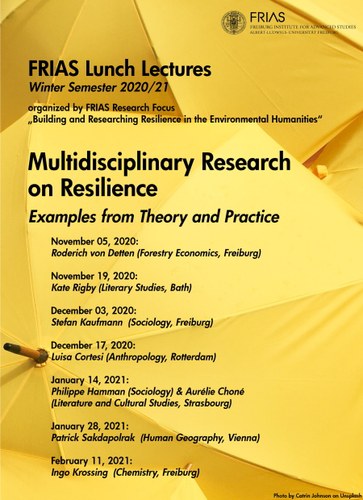Multidisciplinary Research on Resilience 2020/21
Multidisciplinary Research on Resilience: Examples from Theory and Practice
 Despite intensive academic debate about the notion of resilience in human geography, sociology and related disciplines in the second decade of the 21st century, there still is little theoretical basis for a truly multidisciplinary discussion about resilience concepts, strategies and practices. Three areas – ecological resilience, social resilience and material resilience – seem to dominate in publications. By transferring ecological resilience (understood as an ecosystem’s capacity to recover from shocks and perturbations, e.g. from the impacts of climate change) to other disciplines and adapting it to other research objects, shifts in the semantic contours of the concept can be observed. From a sociological perspective, for example, a key question is if and how society succeed in overcoming environmental crises and if capacities for transformation emerge in this process. Psychologists investigate how individuals are able to recover from trauma, while scholars of human geography critically investigate the ideal of ‘resilient cities’. Resilience can also be understood – and criticized - as an apparent promise for increased global security, as an ethos, or even as an ideology linked to contemporary neoliberalism. A core controversy revolves around the question of whether resilience thinking can be a force of good or if it rather prevents more radical, but necessary, transformation.
Despite intensive academic debate about the notion of resilience in human geography, sociology and related disciplines in the second decade of the 21st century, there still is little theoretical basis for a truly multidisciplinary discussion about resilience concepts, strategies and practices. Three areas – ecological resilience, social resilience and material resilience – seem to dominate in publications. By transferring ecological resilience (understood as an ecosystem’s capacity to recover from shocks and perturbations, e.g. from the impacts of climate change) to other disciplines and adapting it to other research objects, shifts in the semantic contours of the concept can be observed. From a sociological perspective, for example, a key question is if and how society succeed in overcoming environmental crises and if capacities for transformation emerge in this process. Psychologists investigate how individuals are able to recover from trauma, while scholars of human geography critically investigate the ideal of ‘resilient cities’. Resilience can also be understood – and criticized - as an apparent promise for increased global security, as an ethos, or even as an ideology linked to contemporary neoliberalism. A core controversy revolves around the question of whether resilience thinking can be a force of good or if it rather prevents more radical, but necessary, transformation.
Since spreading from ecology to sociology and psychology and further into social realms, the concept of resilience has only been discovered by a few humanities fields. However, resilience holds promise for other humanities as well, as it may facilitate broader debate about the ability of individual and collective capacities to persist and change. Many disciplines refer to the concept of resilience in order to understand complex systems threatened by negative events and describe processes of change, but not all humanities naturally work with systems theory and complexity theory. Acknowledging that each discipline has its own theoretical access to resilience, it seems adequate to posit that various resiliences exist. This Lunch Lecture Series will shed a light on multiple and partially divergent perspectives on resilience, by highlighting theoretical and practical approaches from different disciplinary backgrounds. A core aim of the series is to facilitate a multidisciplinary dialogue about the potentials of the humanities engaging more deeply with resilience concepts, strategies and practices.
| 05 November 2020 |
“Resisting", "Reorganizing" and "Maintaining” – Origins and Dimensions of Socio-ecological ResilienceDr. Roderich von Detten, University of Freiburg |
| 19 November 2019 |
'Daily Bread': Resilience, Religion and the ArtsProf. Dr. Kate Rigby, Bath Spa University |
| 03 December 2020 |
Societal Resilience. On the Ambivalences of a ConceptProf. Dr. Stefan Kaufmann, University of Freiburg |
| 17 December 2020 |
Amphibious Omens: Adapting to Dangerous WetnessLuisa Cortesi, Cornell University New York |
| 14 January 2021 |
Concepts, Discourses and Uses of Resilience in Literary and Social Science StudiesPhilippe Hamman & Aurélie Choné, University of Strasbourg |
| 11 February 2021 |
Resilience in Chemical Systems and ProcessesProf. Dr. Ingo Krossing, University of Freiburg |

